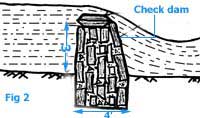|
Small efforts pay big dividends G T Bhimte, a retired superintending engineer offers a simple low cost solution to augment water availability: just stop the water when it flows. When he was in service, he constructed small checkdams and this after his retirement, became his passion. Bhimte has built small check dams in few areas of Madhya Pradesh and Maharashtra, which have proved to be beneficial in making water available for irrigation and drinking purposes. He believes that rainwater could be managed effectively by building small check dams. Water, which normally use to flow waste during the monsoon is now being conserved and eventually helping the people. The most appealing aspect of Bhimte's indigenous methods is that the checkdams are not only constructed at a cheaper rate but also by using locally available materials like cement bags, boulders, coarse sand and black cotton soil . Bhimte has developed five different indigenous methods of damming water in streams and rivulets. Following are the description of all the five water harvesting structures developed by Bhimte.
 Bhimte's fifth structure is constructed along streams, by leaving
a 'V' shaped opening in middle of the permanent structure. The opening in the permanent
structure is filled with cement bags. The purpose of keeping the cement bags is to
partially retain the water in the structure. Bhimte's fifth structure is constructed along streams, by leaving
a 'V' shaped opening in middle of the permanent structure. The opening in the permanent
structure is filled with cement bags. The purpose of keeping the cement bags is to
partially retain the water in the structure.
Bhimte believes that if people are sensitised regarding the benefits of water harvesting then water crisis would be mitigated. Initially, he constructed small checkdams in Chhindwara and Hoshangabad district of Madhya Pradesh. He also got an opportunity to built Salaiyya check dam on Kaliyasote river near Bhopal. After the inspection of the local administration Bhimte got sanction for four extra checkdams in 1994. The checkdams of Hinotiya on Kaliyasot river, Inayatpur, Daulatpur on Kerwan river and Gol on Kerwan tributary were constructed which solved the water problems near Bhopal. He also assisted and supervised the construction of checkdams in Valani village of Nagpur Maharashtra. Vidarbha Nature Conservation Society, a Nagpur-based NGO, was implementing the project. After seeing the output the organisation in Nagpur has adopted the programme in a big way. Thus, the small but consistent efforts of Bhimte are paying good dividends in terms of water availability with increased farm yield. For further information contact:G T Bhimte (Retired Superintending Engineer) 303 – D, Shalimar Township Opposite Scheme No. 78, Indore-452010 Ph. 0731-408 301 |

 The first structure comprises of cement bags that
are stocked up to the height of 3 feet. The cement bags are filled with coarse sand and
mud and are properly stitched. The heap of bags is kept perpendicular to the direction of
the flow of the stream. Similar structures are placed in series for effective water
management.
The first structure comprises of cement bags that
are stocked up to the height of 3 feet. The cement bags are filled with coarse sand and
mud and are properly stitched. The heap of bags is kept perpendicular to the direction of
the flow of the stream. Similar structures are placed in series for effective water
management.  The second structure is more or less
a permanent one. The checkdam is constructed at a cheaper rate by making concrete mix
using crushed metal of different sizes and also various types of sand. Thus, the boulders
are fixed with RCC and on top of the structure cement bags filled with sand are put to
retain more water in the structure.
The second structure is more or less
a permanent one. The checkdam is constructed at a cheaper rate by making concrete mix
using crushed metal of different sizes and also various types of sand. Thus, the boulders
are fixed with RCC and on top of the structure cement bags filled with sand are put to
retain more water in the structure.
